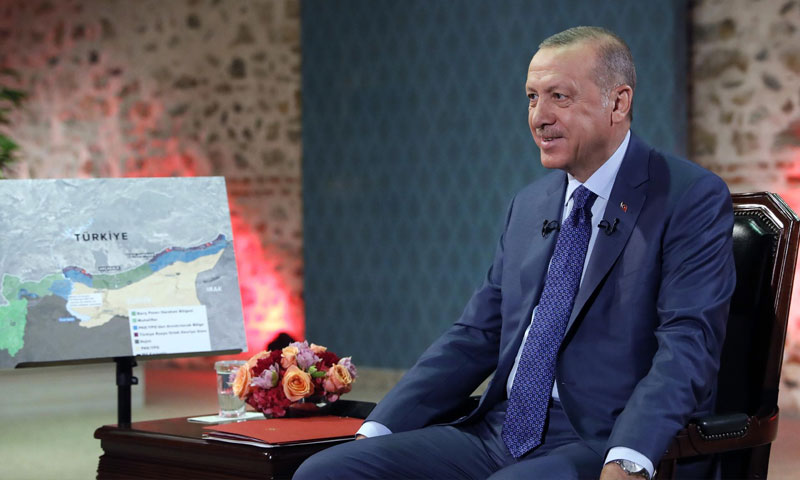



The Syrian file is further complicated by the regional competition during the years of the multi-layered war. However, 270 hours of agreement between Turkey and the United States on the one hand and between Turkey and Russia on the other were enough to shuffle the cards in Syria in general and in the Eastern Euphrates area in particular.
Turkey launched Operation Peace Spring together with the Syria National Army against the Kurdish People’s Protection Units (YPG) on 9 October, aimed at rooting them and setting up a safe zone along the Syrian-Turkish border at a depth of 32 kilometers.
After days of the military operation, Ankara agreed with Washington on a 120-hour ceasefire starting 17 October, to allow the withdrawal of the YPG from the safe zone. However, Washington’s stalling over the implementation of that agreement, forced Recep Tayyip Erdogan to redirect its efforts towards his Russian counterpart, Vladimir Putin. After six-hour-long talks, the two presidents reached an agreement that Erdogan hailed as “a historic agreement.” Under terms of the agreement, Kurdish forces had 150 hours (six days) to pull out of the region.
Unimplemented plan
The Turkish-Russian relationship has seen dramatic progress on the Syrian file, moving from a state of confrontation and tension to a state of agreement and alliance. However, the agreement might still not work out due to some remaining disagreements on certain issues. Another hurdle in the implementation is that the US-backed Syrian Democratic Forces (SDF) has rejected the agreement. Moreover, different maps offered by the two sides show diverging interpretation of the agreement.
On October 23, the Russian Ministry of Defense published on its official website a map of the agreement, showing that the cities of Manbij and Tel Rifaat in the countryside of Aleppo will be under the control of the Syrian regime forces while Turkey and Russia will conduct joint patrols in the city of Ayn al-Arab (Kobani). On the other hand, the Turkish President, in an interview made on 24 October with TRT, stated that the cities of Manbij and Tel Rifaat will be under the control of the Syrian National Army with no access to Syrian regime forces. He confirmed that the Turkish army will play an observer role in Manbij.
As for the city of Ayn al-Arab (Kobani) located in the countryside of Aleppo, Erdogan stressed that “Russia urged Turkey to enter Ayn al-Arab, and unlike the Russians, the United States requested the opposite. Nevertheless, we will make our decision according to developments.”
Turkey was also alarmed by Russia’s communication with the commander of the SDF, Mazloum Abdi, who is wanted by Interpol with a red notice involving persons categorized as terrorists in Turkey. Russia’s Defense Minister, Sergei Shoigu held a phone call via satellite connection with Abdi on 24 October 2019, in an attempt to reassure him and push him to implement the agreement with Turkey.
The Turkish President said during the meeting of the consultative council of Fenerbahçe Club on 26 October that “it is saddening that presidents of great countries meet with the leaders of terrorists organizations and talk to them at the same table.” He also stressed that Turkey will never sit at a table with “terrorists,” refusing to entertain any mediation between them and the SDF. Moreover, Erdogan threatened Russia to resume the military operation if the Kurdish forces did not retreat from the region during the period agreed with Russia.
Erdogan pointed out that “if the terrorists are not cleared at the end of the 150 hour deadline, we will take control and clean it ourselves,” emphasizing that Turkey will continue its pursuit of the YPG/PKK terrorists anywhere if they keep on launching attacks against Turkey from inside or outside the 30 kilometer depth of the agreed area.
Terms of the 22 October agreement between Russia and Turkey
if you think the article contain wrong information or you have additional details Send Correction